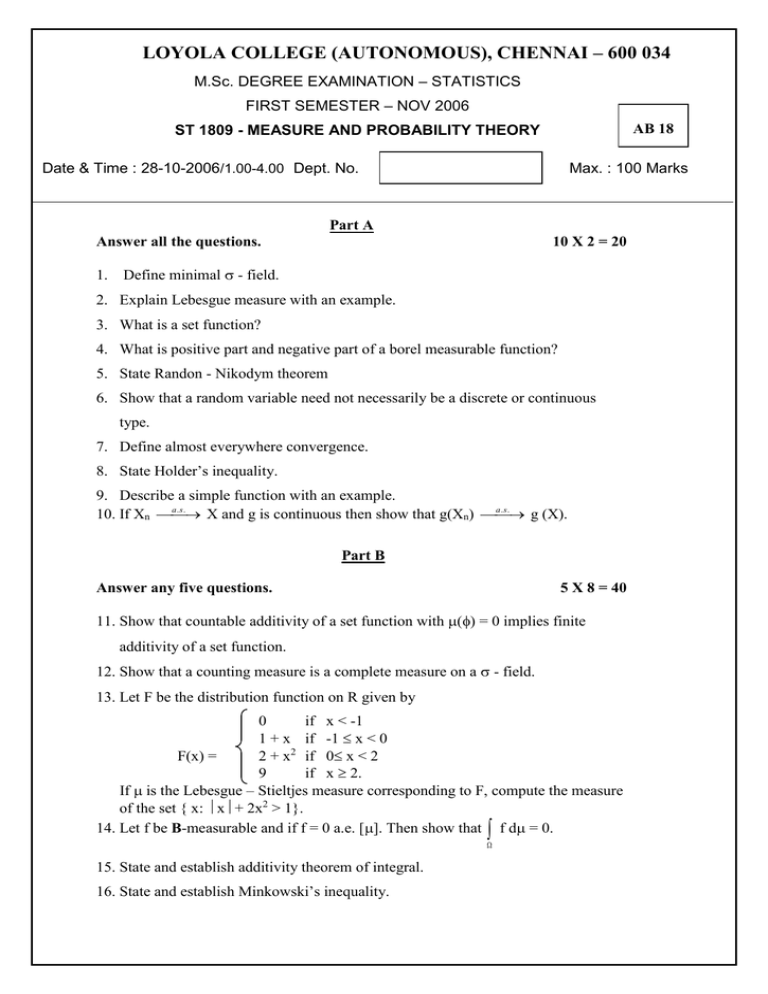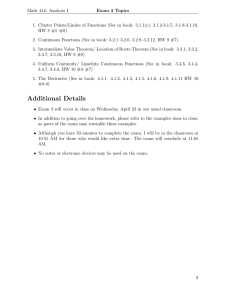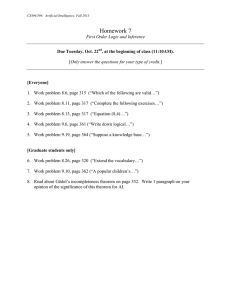LOYOLA COLLEGE (AUTONOMOUS), CHENNAI – 600 034
advertisement

LOYOLA COLLEGE (AUTONOMOUS), CHENNAI – 600 034
M.Sc. DEGREE EXAMINATION – STATISTICS
FIRST SEMESTER – NOV 2006
AB 18
ST 1809 - MEASURE AND PROBABILITY THEORY
Date & Time : 28-10-2006/1.00-4.00 Dept. No.
Max. : 100 Marks
Part A
Answer all the questions.
1.
10 X 2 = 20
Define minimal - field.
2. Explain Lebesgue measure with an example.
3. What is a set function?
4. What is positive part and negative part of a borel measurable function?
5. State Randon - Nikodym theorem
6. Show that a random variable need not necessarily be a discrete or continuous
type.
7. Define almost everywhere convergence.
8. State Holder’s inequality.
9. Describe a simple function with an example.
a .s .
a .s .
10. If Xn
X and g is continuous then show that g(Xn)
g (X).
Part B
Answer any five questions.
5 X 8 = 40
11. Show that countable additivity of a set function with () = 0 implies finite
additivity of a set function.
12. Show that a counting measure is a complete measure on a - field.
13. Let F be the distribution function on R given by
0
if x < -1
1 + x if -1 x < 0
F(x) =
2 + x2 if 0 x < 2
9
if x 2.
If is the Lebesgue – Stieltjes measure corresponding to F, compute the measure
of the set { x: x + 2x2 > 1}.
14. Let f be B-measurable and if f = 0 a.e. []. Then show that f d = 0.
15. State and establish additivity theorem of integral.
16. State and establish Minkowski’s inequality.
p
p
17. If Xn
X then show that (Xn2 + Xn)
(X2 + X).
18. Describe Central Limit theorem and its purpose.
Part C
Answer any two questions.
2 X 20 = 40
19. a). If { Ai , i 1) is a sequence of subsets of a set then show that
Ai =
i 1
(A i - A i – 1).
i 1
b). Show that a monotone class which a field is - field.
(10 +10)
20. a). State and establish basic integration theorem.
b). If
hd exists then show that hd
h d
(12 + 8)
21. a). State and establish monotone class theorem.
b). If
m
m
Xn r.
X then show that EXnr r.
EXr as n . (12+ 8)
22. a). Show that Liapunov’s Central Limit theorem is a particular case of
Lindeberg’s Central Limit theorem.
b). State and establish Levy’s theorem.
******************
*****
(8 + 12)


